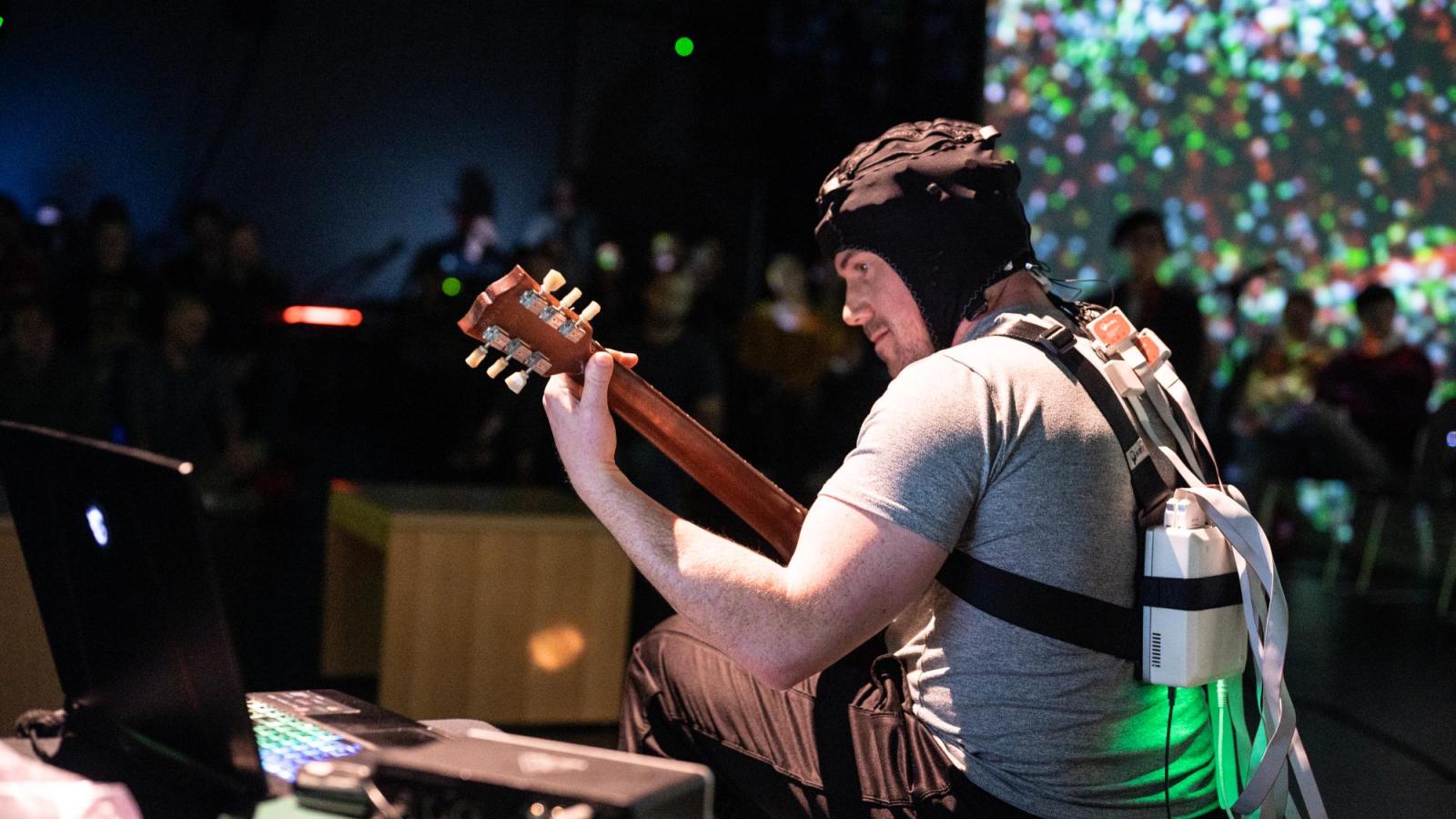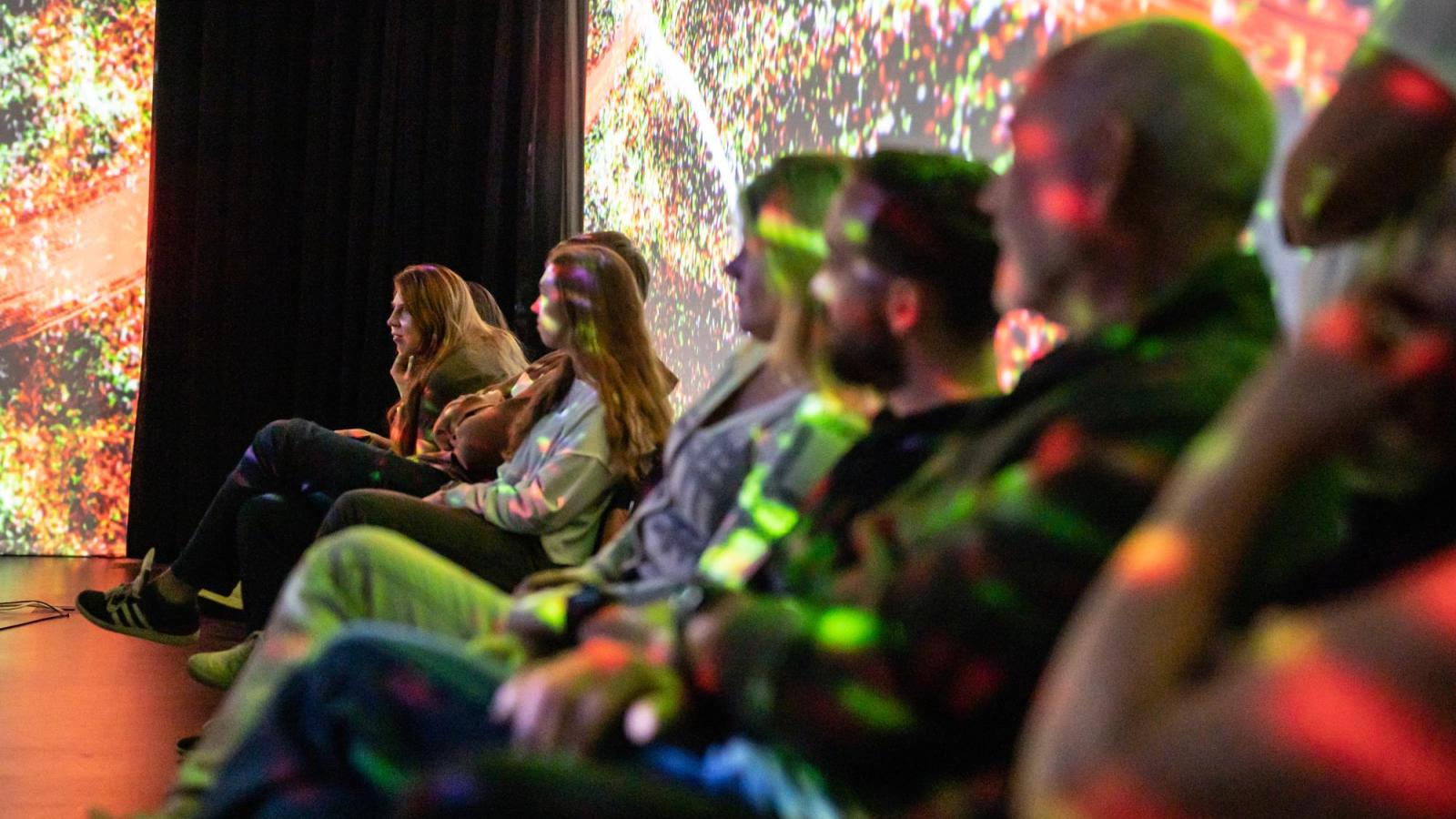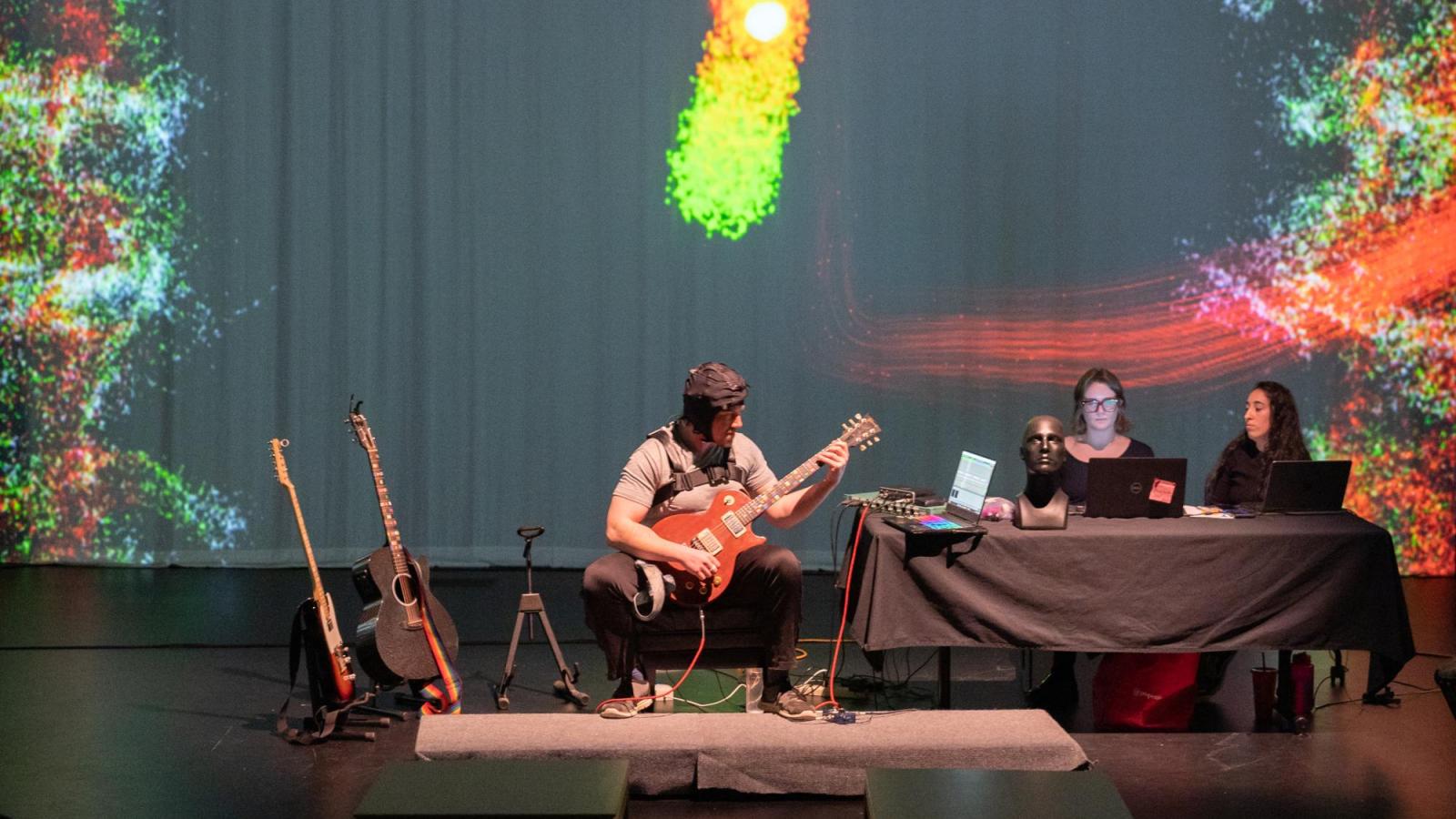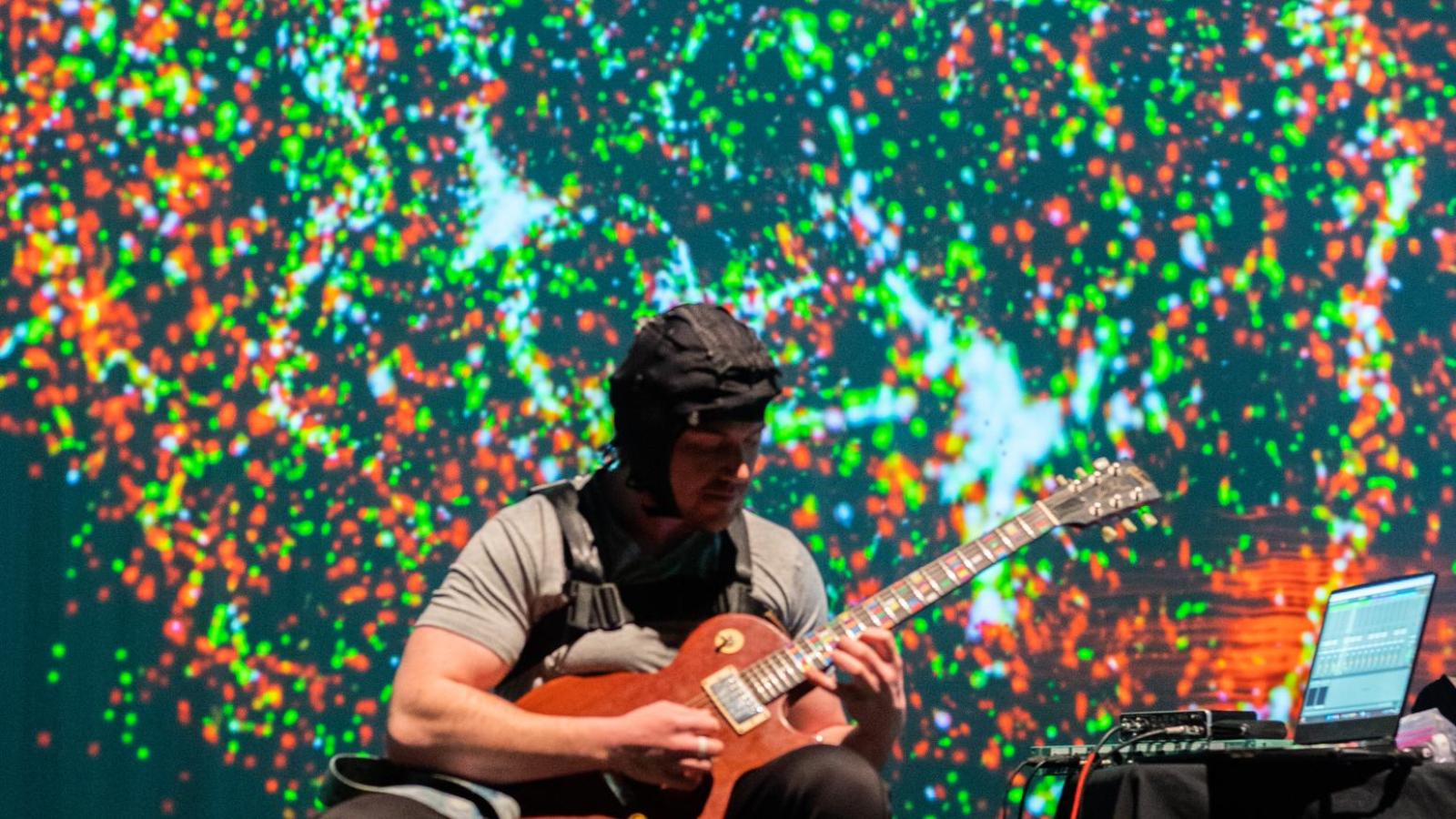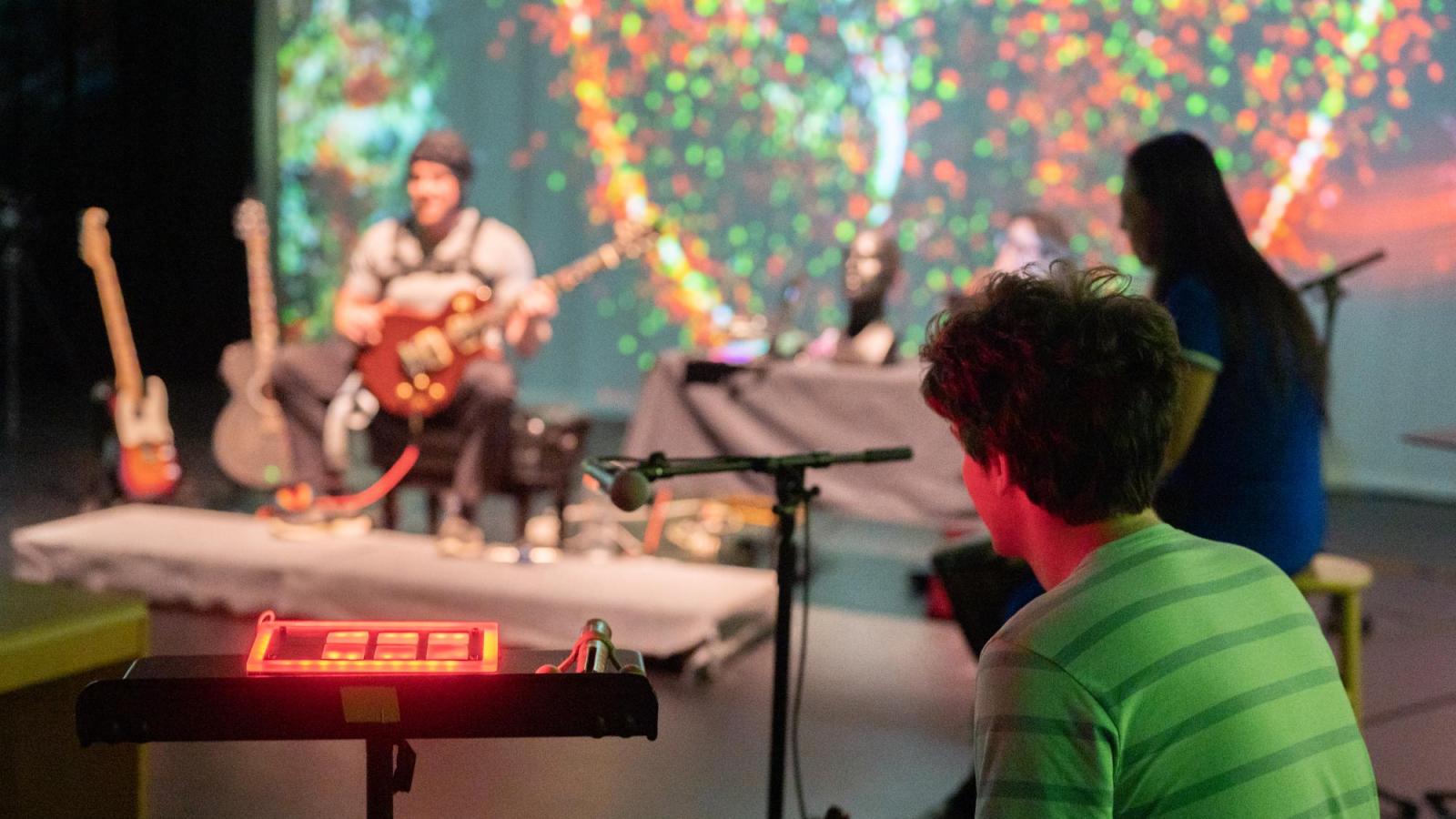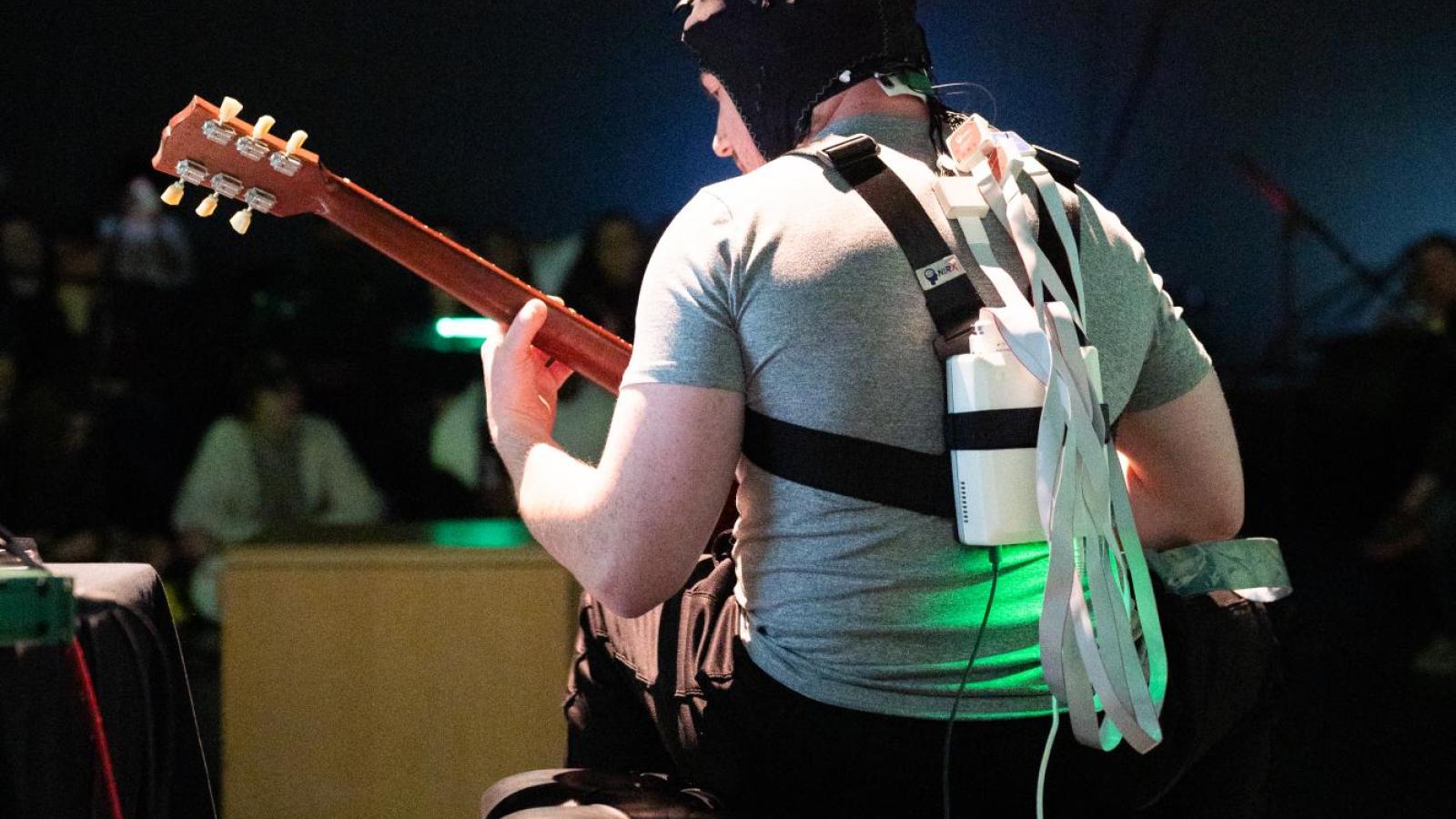Stringesthesia
Witness the formation of music through brain-scanning technology
Stringesthesia is an interactive performance that engages the audience as part of a musical improvisation with the sole guitar player on stage (Torin Hopkins). Using color and light, controlled by projection mapping and interactive instruments, audience members will be able to play music and influence Torin’s musical improvisation. Torin’s trust in the audience will be gauged using live brain-scanning technology and his changing trust level will affect the ways in which the audience can participate during the performance—challenging the traditional performer-audience dynamic in live musical performance.
CU AFFILIATION
ATLAS
RESIDENCY TYPE
Performance
FEATURED B2 TECHNOLOGIES
Ambisonic sound system, large scale projection, audio recording, video recording, tension grid
RESIDENCY DATES
October 17, 2022 - October 22, 2022
TAGS
Musical Improvisation, Neuroscience, Creative Technology, Interactive Performance
About the Artists
Torin Hopkins is a triple PhD student in ATLAS, neuroscience and cognitive science. His research focuses on the future of music interaction and collaboration. Hopkins researches how players interact with music and seeks to explore new methods of interaction using techniques from HCI, neuroscience, psychology, music cognition and design. Hopkins, a music teacher of 12 years and lifelong performer, is passionate about music collaboration, music education and new forms of interaction in music using computers. Systems developed and studied by Torin include technologies such as AR/VR/XR/holograms, networked music, augmented instruments/notation, brain-computer interfaces and AI assisted music systems. Torin is advised by Ellen Do, professor of computer science and director of the ACME lab at the ATLAS Institute. CU Affiliation: ATLAS, Neuroscience, and Cognitive Science PhD Student
Che Chuan "Suibi" Weng is an ATLAS PhD student and an experienced interactive media engineer and digital artist. He specializes in developing interactive installations, especially the AR/VR and Arduino components. He has taught technical courses such as Unity Development and Arduino Basics at three universities. Furthermore, as a digital artist, his works were accepted to the Digital Arts Festival in Taipei and 404 International Festival of Art and Technology in Argentina as well as several others. CU Affiliation: ATLAS PhD Student
Netta Ofer is a PhD student in the Living Matter Lab at the ATLAS Institute. Her background is in media studies, human-computer interaction (HCI), and interaction design from the Media Innovation Lab (milab) at IDC Herzliya and dance and movement practices. Netta’s work has focused on how coding can create creative and personally-meaningful opportunities for children, specifically by bridging the digital and physical worlds. Today, her artistic and research work asks questions about our relationships with living matter through de-centering the human in design research and designing interactive experiences that introduce practices of fostering, growing, care, and collaboration. CU Affiliation: ATLAS PhD Student
Peter Gyory received a Bachelor of Science degree from the Rochester Institute of Technology in game design and development. After graduation, he worked for the digital agency, Sapient Razorfish, as an interactive developer. He also became an avid open-source software advocate during his time at RIT and hosts all of his personal work on Github so that others can freely build upon it. While in the ATLAS CTD program, where he received an MS in 2019, Peter focused on game development, creating games and experiences that help people both laugh and learn. He is continuing his studies as an ATLAS PhD student, working with Professor Ellen Do. CU Affiliation: ATLAS PhD Candidate
Emily Doherty is a PhD student in Computer Science advised by Leanne Hirshfield. At the SHINE Lab, Emily works primarily with fNIRS data to better understand human workload in different conditions such as human-agent teaming and virtual reality. She earned her B.S. in Biomedical Engineering from the University of Massachusetts Lowell in 2021. Her research interests lie in Human-Computer Interaction/Human-Robot Interaction/Non-Invasive Brain Imaging and human-agent teaming. Specifically, the goal of this research is to quantify human workload through non-invasive brain measurement to promote effective teaming. CU Affiliation: Computer Science PhD Student
Derrek Chow is an interdisciplinary researcher, designer and creative technologist from Toronto. His work explores human-computer interaction and the intersections of art, design and technology to create new, more empowering and humane ways to interact with computers. Derrek received an undergraduate degree from the University of Waterloo, where he studied in the Exii (Expressive Input & Interaction) group. During this time, he was a design intern at RNDR, Netherlands and a visiting researcher at the NTU HCI Lab in National Taiwan University. CU Affiliation: ATLAS Visiting Researcher
Rishi Vanukuru is a PhD student and a researcher in the ACME lab. Advised by Ellen Do, his research explores the design of immersive interfaces that support learning, creativity, and collaboration. Before joining ATLAS, Rishi completed an undergraduate degree in civil engineering, and a graduate degree in interaction design, both from the Indian Institute of Technology Bombay. CU Affiliation: ATLAS PhD Student
Chad Tobin is a fourth-year undergraduate student pursuing a degree in Creative Technology and Design alongside a minor in computer science. He is currently working on a project in the ACME Lab called the Holojam, where he is using machine learning to help create responsive AI musicians to play music with the users. He is experienced in many different forms of software, especially with Ableton, Arduino, and Python. He is interested in combining music and technology to create interesting and meaningful experiences for a wide variety of people. CU Affiliation: ATLAS Undergraduate Student



